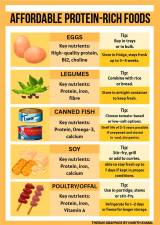PETALING JAYA: Soaring food costs are reshaping what urban Malaysians put on their plates, raising concerns for nutrition.
The rise of food prices is altering household diets and putting middle-income families at risk of “hidden hunger”, said Malaysian Dietitians’ Association council member and freelance dietitian Rozanna M. Rosly.
“In my clinical practice, I see more families, including lower-middle and even middle-income urban households, cutting back on meat, fish, eggs and milk because of higher prices.
“This matches national data showing falling diet diversity and growing urban food insecurity.”
A March 2025 University of Malaya study found nearly one in five urban households faces food insecurity, with many switching to cheaper, calorie-dense processed foods.
Globally, healthy staples like lean meat, eggs and fresh produce have risen in price faster than sugary or ultra-processed items, widening the affordability gap.
Rozanna warned that this shift fuels hidden hunger – a form of malnutrition where calorie intake is sufficient but essential nutrients such as iron, zinc, calcium and vitamin A are lacking. Reports, including Khazanah Research Institute’s Unhealthy but Not by Choice, highlight persistent micronutrient shortfalls despite adequate energy intake.
“Families are adapting in ways that erode diet quality.
“Parents are stretching meals with more rice or instant noodles, buying cheaper processed meats like chicken franks or canned sardines and reducing fresh vegetables,” Rozanna said, adding that some buy near-expiry foods at night markets, wait for discounts or dilute soups to feed more mouths, while mothers often skip meals so children can eat.
Children and pregnant women are most at risk, she warned.
“Their nutrient needs are higher relative to body weight, so a lack of iron or vitamin-rich foods can have lasting effects on growth, learning and immunity,” she said, highlighting that iron deficiency anaemia, zinc and vitamin A shortfalls remain common, weakening immunity and stunting development.
She said the damage can be permanent. Poor diets in the first 1,000 days – from conception to age two – can impair brain growth, learning capacity and lifetime earning potential.
Adults on low-protein diets face muscle loss, frailty and higher risks of cardiovascular and non-communicable diseases. National surveys already show a double burden of obesity and nutrient deficiency within the same households, she said.
Rozanna urged policymakers to address diet quality, not just calorie sufficiency.
“School feeding programmes must include protein and fresh produce. We need stronger growth monitoring, targeted support for pregnant women and measures to keep nutrient-rich foods affordable.”
Without intervention, she warned, Malaysia could face a silent but severe public health challenge.
“The impact on health and productivity will be felt for generations,” she added.
